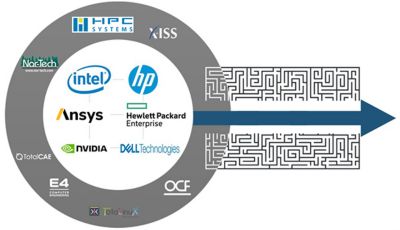-
-
Software gratuito per studenti
Ansys potenzia la nuova generazione di ingegneri
Gli studenti hanno accesso gratuito a software di simulazione di livello mondiale.
-
Connettiti subito con Ansys!
Progetta il tuo futuro
Connettiti a Ansys per scoprire come la simulazione può potenziare la tua prossima innovazione.
Paesi e regioni
Customer Center
Supporto
Partner Community
Contatta l'ufficio vendite
Per Stati Uniti e Canada
Accedi
Prove Gratuite
Prodotti & Servizi
Scopri
Chi Siamo
Back
Prodotti & Servizi
Back
Scopri
Ansys potenzia la nuova generazione di ingegneri
Gli studenti hanno accesso gratuito a software di simulazione di livello mondiale.
Back
Chi Siamo
Progetta il tuo futuro
Connettiti a Ansys per scoprire come la simulazione può potenziare la tua prossima innovazione.
Customer Center
Supporto
Partner Community
Contatta l'ufficio vendite
Per Stati Uniti e Canada
Accedi
Prove Gratuite
ANSYS BLOG
February 28, 2020
The Truth about Ansys Simulations on the Cloud and HPC
Engineers are faced with the challenge of analyzing complex simulations while meeting tight deadlines. As a result, compute capacity is limiting the performance of many engineering organizations.
High-performance computing (HPC) and cloud deployments can clear this simulation bottleneck. However, there are still misconceptions about the reliability, complexity, licensing, cost and security of these systems.
Don’t let cloud misconceptions block its benefits.
These myths can delay, or prevent, the adoption of additional compute resources that can provide significant return on investment for product development teams.
While obstacles to cloud and HPC adoption vary by company, here are some common misunderstandings that stymie their acceptance. To learn how to dispel these misconceptions, watch the webinar: Debunking Myths of HPC, Cloud and Licensing.
Some Users Don’t See the Need for HPC
While your simulation tasks may be running at acceptable speeds, research has found that 40% of engineers limit the size and detail of their models due to their compute capacity constraints.
Some managers may not see the need for the cloud. But when they see the data, they might be convinced to start their expedition to the sky.
Additionally, there is evidence that shows a predictable return on investment when running simulations on new HPC hardware.
For example, Ansys Mechanical demonstrates that simulation speeds could be improved by 59% by using the latest generation of Intel Xeon Gold processor.
Do You Need to Move Results from HPC Clusters onto a Desktop for Post-Processing?
Remote display tools and virtual desktop infrastructure (VDI) eliminate the need to transfer large files across the network. In this distributed model, engineers can rapidly access the HPC hardware and interactively post-process the simulation results from any computer.
Virtual desktops can eliminate the transfer of big data sets across the network.
This distributed setup not only saves time, it also makes it easier to share results and collaborate across the organization.
Ansys supports the ability to access its software through remote and virtual desktop setups.
Can HPC Deployments Strain IT Resources?
It is true that many organizations struggle with sizing, integrating, provisioning and supporting HPC clusters.
However, these applications can be externally managed, so an organization’s IT department doesn’t have to worry about their HPC cluster. Additionally, these resources can be purchased or leased at affordable price points.
Ansys has teamed up with HPC strategic partners to make specification and deployment of HPC easier.
That is why many Ansys HPC partners offer turnkey HPC cluster appliance solutions that are optimized and preconfigured for Ansys workloads, simulation software and job management software.
Are Cloud Solutions Complex to Deploy, Manage and License?
Complex deployments may be the case when a company tries to build its own cloud infrastructure. But why would organizations do this when they can gain access to both on-premise and cloud-based license management options?
Engineers want to process their simulations as fast as possible, but they are not doing this when they are spending time deploying cloud infrastructure. It’s much better to license the software for use on the cloud and to license the hardware for simple and fast deployment.
You don’t have to build your own cloud infrastructure. The complexity is taken out of the system when the deployment, management and licensing are already taken care of.
There are flexible licensing options to fit various customer needs. This way, customers can pay for what they use, or buy licenses to manage continuous workloads. For instance, organizations can use a traditional lease to cover everyday simulations and elastic licensing to meet fluctuating capacity.
As an example, the Ansys Cloud and Ansys cloud-hosting partners offer managed turnkey applications that are easy to access, deploy, manage and license.
Is the Cloud Secure Enough for Simulation Data?
The insecurity of cloud data is an old argument that is typically out of date. Data in the cloud is often more secure than it would be in an on-premise server.
Cloud providers have the technology, encryption programs and economies of scale to encrypt data better than many other organizations.
This is because the technology, encryption programs and economies of scale in place for most cloud providers enables them to secure data better than the average organization. At the end of the day, the robustness of cloud security depends on the steps taken to secure the data.
Ansys Cloud, for example, was developed using Microsoft Azure. See its architecture and security overview.
Will the Cloud Always Save Money?
It is true that a cloud license could have a similar price point to an organization’s current HPC solutions. However, the sole value of the cloud isn’t that it shifts the cost of hardware or software maintenance to another entity — which is a significant reason why many people shift to the cloud. A total cost of ownership (TCO) should also consider the fact that instant access to greater compute resources can save a tremendous amount of time.
The cloud will not always offer direct cost savings compared to HPC. But it does offer flexibilities and time savings that could boost throughput and affect the total cost of ownership.
Cloud resources can be easily reconfigured, updated and scaled up — or down — on demand. That flexibility provides value because it can increase simulation throughput and accuracy without the need to buy additional hardware resources.
Remember, the use of HPC and cloud resources can provide a significant competitive advantage because it enables access to computing power and software applications that engineers need.
To learn how to debunk other cloud and HPC myths, watch the webinar: Debunking Myths of HPC, Cloud and Licensing.
Any and all ANSYS, Inc. brand, product, service and feature names, logos and slogans such as Ansys, Ansys Cloud and Ansys Mechanical are registered trademarks or trademarks of ANSYS, Inc. or its subsidiaries in the United States or other countries.






